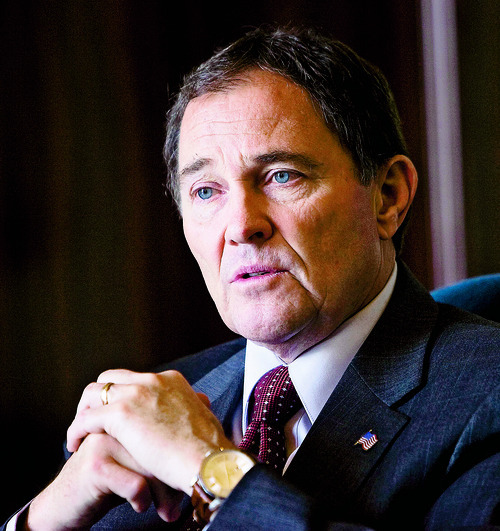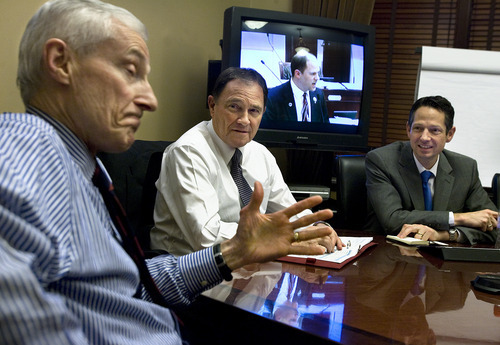This is an archived article that was published on sltrib.com in 2012, and information in the article may be outdated. It is provided only for personal research purposes and may not be reprinted.
Touting Utah's ability to weather a tough economy and return to growth, Gov. Gary Herbert said Tuesday that voters should re-elect him in November.
The governor enters the campaign with several hundred thousand dollars in the bank and, according to a new poll, strong support from Utah voters.
It marks the second time in two years that Herbert has launched his run for governor. He won a decisive victory against Salt Lake County Mayor Peter Corroon in 2010 after inheriting the office in 2009 when Jon Huntsman resigned to become U.S. Ambassador to China.
Herbert is touting Utah's economic recovery, with 36,000 jobs created in 2011 and an unemployment rate that dripped from 8 percent to 5.7 percent.
"I believe being the coach of the team is a significant role. It's a team effort," Herbert said, noting that the private sector creates most of the jobs, but the state has been able to create a business-friendly environment.
"If you'll judge me on the results, I think you'll want to keep me as coach of the team," he said.
Utah has received numerous accolades from national publications for its pro-business climate; personal income has grown by nearly 5 percent and Herbert has set a goal of creating 100,000 jobs in 1,000 days.
"I will focus laser-like on continuing to create jobs and grow the economy," Herbert said. "I will not rest until everybody who wants a job can find a job."
The governor said he has also made public and higher education a priority during his administration, with more than $100 million in new money going toward education in the coming year, although Utah continues to have the lowest per-pupil spending in the country.
"We're not where we want to be, but certainly we're going in the right direction," Herbert said.
Herbert's opponents — he has four Republican challengers and a Democrat, so far — argue that Herbert has benefited from good economic conditions in the state that weren't really of his making and has not been a strong leader.
"I think we have suffered from a lack of leadership at the top and we're not in as good of a fiscal situation as is being portrayed," said David Kirkham, a tea party founder challenging Herbert. "We're the cleanest room on the Titanic and what's really going on is we've doubled our debt in the last two years."
In the 2009 budget year, the state had issued about $1.5 billion in bonds. This year, the state has about $3.7 billion in bonds outstanding. The state debt per citizen has jumped from about $400 per person to $1,262 per person.
State Rep. Ken Sumsion, R-American Fork, questioned whether Herbert was committed to fighting the federal government for ownership of public land, a key issue in Sumsion's bid.
"My frustration with our currrent governor is he's too passive on this issue and I would even say that I'm not sure he truly believes in the fight," Sumsion said. "There's a difference between talking about it and really digging in and pressing hard on that issue."
Sumsion said the governor has also benefited from work the Legislature has done cutting budgets, while Herbert has recommended tax hikes and more government growth.
Democratic challenger, Peter Cooke, a businessman and retired two-star general, said he doesn't consider it a contest between himself and Herbert, "but to offer leadership that I think I've demonstrated in small business and the military."
"I'm offering that up to the state. I think Utah is at a crossroads where we need strong leadership, which I offer," he said.
A new survey conducted by the Center for the Study of Elections and Democracy at Brigham Young University shows that 68 percent of voters approve of the job Herbert has done as governor.
Herbert's approval dipped to 62 percent a year ago, on the heels of a bruising debate over immigration reform and wildly unpopular changes to the state's open-records law.
Otherwise, Quin Monson, associate director of the center, said Herbert's approval has been in the high 60s or low 70s since he took office. Among strong Republicans — who typically make up the delegates who nominate their party's candidate — Herbert has a 94 percent approval rating.
"That sort of clinches the idea that any kind of challenge from within the Republican Party isn't likely to be too big a deal to him," said Monson. "I don't think anything has changed. There wasn't any major problem in the legislative session."
gehrke@sltrib.com Twitter: @RobertGehrke





